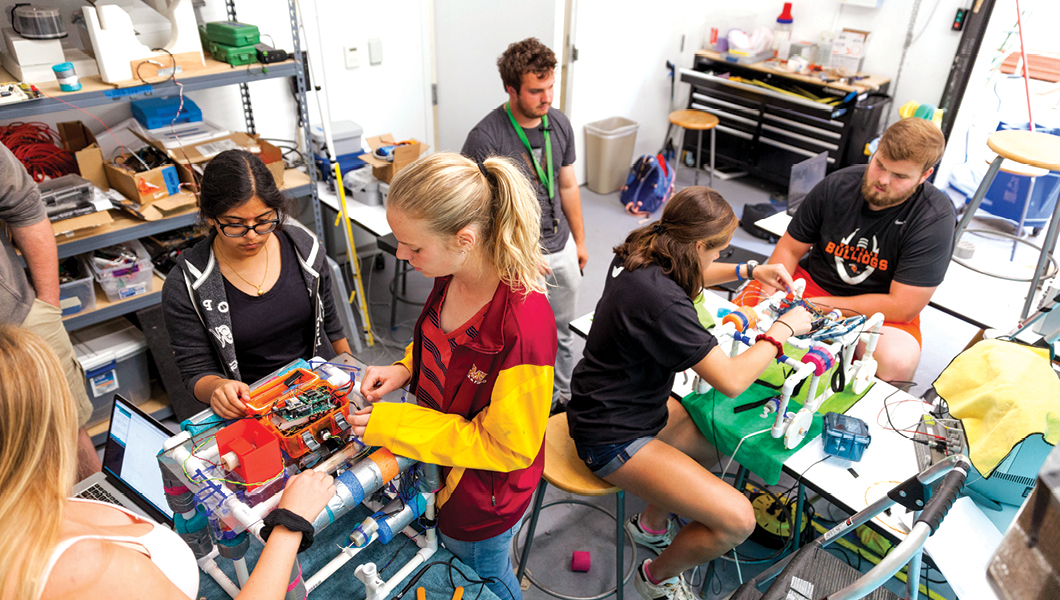College News
A New Core
The College strives to create an equitable educational environment and offer a curriculum that prepares STEM leaders who graduate with a clear understanding of the impact of their work on society. With this goal in mind, the faculty voted on May 8, 2020 to approve a new Core Curriculum. The rollout out of this new curriculum will begin in the fall of 2021 or 2022, determined, in part, by the ongoing pandemic.
Known as Four Courses with Optional Electivity, the curriculum addresses two major themes that drove the review process: a refined focus of topics, which will give students more time to reflect on what they learn and a more direct engagement with the “impact” part of Harvey Mudd’s mission. The new curriculum encourages students to take roughly four courses per semester during Core, with the option to take a fifth, elective course.

One feature of the curriculum is the presence of an “impact” course, which all students will take in their fourth semester and is a nod to the language in the College’s mission statement: “… with a clear understanding of the impact of their work on society.” The particular nature of this course is still being developed; in the near term, it will likely focus on aspects of climate change.
Work on this new Core Curriculum began in 2015. At the request of the HMC Teaching and Learning Committee, consultants from the Center for Inquiry of Liberal Arts visited HMC intent to answer the question, “What can the Teaching and Learning Committee do to support a true sense of achievement among students?” The consultants produced an 18-page report on their findings, “Learning at Mudd: Insight into the Student Academic Experience” (aka the Wabash Report). This report proved controversial when confidential remarks were made public. As a result, administrators and faculty members pledged to make the process more transparent and expanded efforts to include students in developing the new Core. Led by Tom Donnelly, then Core Curriculum director, the Core Review Planning Team (composed of faculty, students, a staff member and the president of AABOG) moved the College’s Core review process forward.
During spring 2017, the College hired external consultants to talk to faculty, students and alumni regarding perceptions of the Core goals and the current Core implementation. The consultants posed seven questions, including: How well does the current Core address the College mission statement? and How well does the current Core meet the needs and interests of our students? Following its internally generated self-study of the Core, HMC had an external team on campus Nov. 13–15, 2017 to meet with all College constituencies and gather first-hand information about its Core. The team’s findings, insights and recommendations were discussed in multiple community forums. At the end of the fall 2017 semester, after months of data collection and discussion throughout the HMC community, the faculty voted to approve a goals statement:
The Core Curriculum at Harvey Mudd College seeks to nurture students’ intellectual curiosity and joy of learning, provide them with foundational knowledge and skills needed for advanced study in STEM disciplines and begin a critical engagement with the humanities, social sciences, and the arts. In keeping with HMC’s STEM-focused approach to liberal arts education, the Core introduces students to thinking critically about consequential problems and complex issues, making connections across disciplinary boundaries, communicating and collaborating effectively, and understanding how their personal and professional actions impact the world around them.
Regular updates and progress reports flowed to the HMC community via e-mail, information sessions, alumni and parent e-newsletters and the Harvey Mudd College Magazine, and through alumni and parent meetings and events.
“Throughout the entire Core review, we worked closely with ASHMC and staff representatives, as well as the AABOG leadership. At each stage, we made the process as transparent and open to input as possible,” says Donnelly.
After multiple Core Curriculum workshops for faculty, Core proposals were requested on April 27, 2018. Following review and discussion, the faculty voted on six Core proposals March 5, 2020.
Since arriving at a new curriculum, an Implementation Committee has been working with departments and the faculty to finalize important details, like understanding the downstream impact of the new Core on each department, determining the timeline for introducing the new Core courses and evaluating whether the requisite funding and staffing are in place.